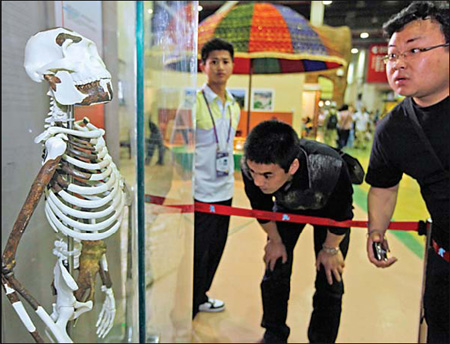SHANGHAI - Lucy, a 3-million-year-old human skeleton fossil, will be on display for the remainder of Expo 2010 Shanghai.

Two visitors stare at the replica of Lucy, a 3-million-year-old human skeleton fossil, on display in the Ethiopia section of the Joint Africa Pavilion on Thursday in Expo 2010 Shanghai. Photo by Yong Kai / For China Daily more photos |
The skeleton is a replica and its display was opened to the public on Thursday in the Ethiopia section of the Joint Africa Pavilion.
The exhibit, created 30 years ago, contains the only replica of the skeleton in the world. It was preserved in the Ethiopian National Museum in Addis Ababa, the capital city of Ethiopia.
|
Full Coverage:
 | | |
"It is equally as important as the original version, because it gives visitors at least a picture of what Lucy looks like," said Sisay Getachew Azage, commissioner general of the Ethiopia section. "It is a chance for the Chinese to know more about the origin of humans."
Donald Johanson and Tom Gray discovered Lucy in November 1974, making her the earliest known hominid, dating back 3.2 million years.
"Before Lucy was discovered, we thought the earliest that humans walked upright was 2 million years ago," said Teshome Regassa Feyissa, who is a specialist with 25 years of research experience in the Ethiopian National Museum. "The finding of Lucy also signifies that Africa is the cradle of human beings."
Feyissa said Lucy is the oldest, most complete skeleton, with 40 percent of her bones recovered, providing much more detailed information about human beings.
Feyissa will work in the Joint Africa Pavilion until June to tell visitors about Lucy in English. The section operators will try to find a Chinese speaker to translate.
Preserved in a transparent case, the skeleton is formed with black and white bones, with the black portion of the skeleton representing the parts that were discovered in 1974.
It is the third time the replica of Lucy has been presented at a World Expo. It was previously shown at the Hanover Expo in 2000 and at the Zaragoza Expo in 2008.
Lucy was identified as a female based on her size, who died in her 20s. She may have given birth to a baby. Lucy's brain size is much smaller than that of today's normal adult.
Lucy obtained her name from The Beatles' song, Lucy in the Sky with Diamonds, which is often played in celebration of her discovery.

